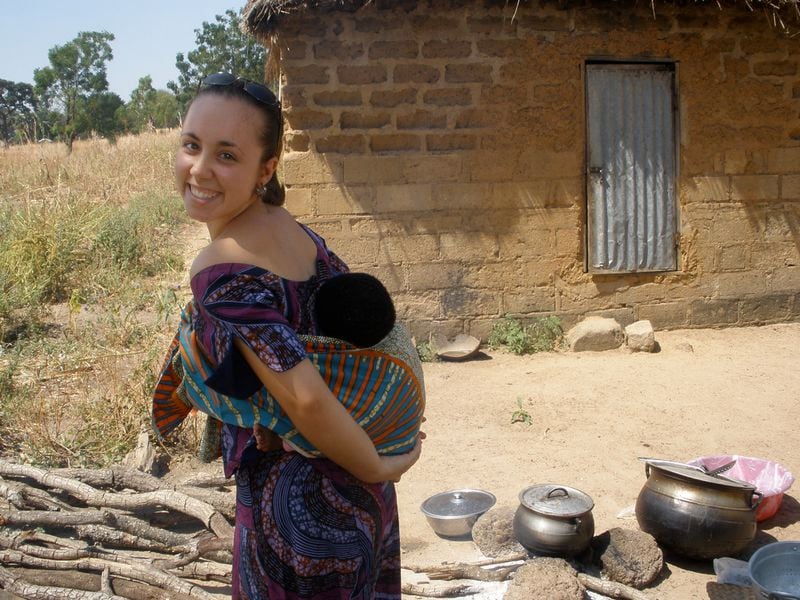Six years after 24-year-old Kate Puzey of Georgia was murdered while serving in the Peace Corps, a report this year shows the Peace Corps still doesn't properly protect thousands of volunteers who do its work. Another report released recently showed that volunteers needing mental or emotional treatment after they leave service can wait weeks or months to have claims approved.
A law passed in Puzey's memory in 2011, the Kate Puzey Peace Corps Volunteer Protection Act, was supposed to revolutionize the safety of volunteers. But a scorching follow-up audit by the agency's own inspector general says that it is failing to follow through, on a multitude of levels.
Credit: Ariel Hart
Credit: Ariel Hart
The Peace Corps has never met its own safety goals, according to the report. It has failed to consistently measure and communicate its own safety goals and processes, "making progress tracking almost impossible." Long delays in Peace Corps safety evaluations "could have serious repercussions for Volunteer safety."
The document doesn't say whether it can link the procedural failures to a specific harm that befell anyone. But examples of gaps included failing to train significant numbers of its security personnel on GPS equipment or on how to test satellite phones and radios -- think now of distant, hard-to-find volunteer homes and meeting places.
The data in the report is incomplete, since some security personnel didn't even respond to the inspector general's questions. It's peppered with quotes from Peace Corps officials who did respond, such as, "Every [Regional Security Officer] is angry and feels like he/she doesn't have enough information to do their job," or, in discussing officials' own failure to measure how many critical safeguards are implemented, "I hate this notion that we decide which recommendation is critical..We are trying to get away of such 'criticality' characterization."
A separate report, released within the last month, found that after Peace Corps service, volunteers' most common worker's comp claims included mental and emotional conditions; and that the federal government's goal for traumatic cases was to take 45 days (or less) to approve or deny the claim. It gave itself one year for non-traumatic cases. Over five years 3,300 returned volunteers received workers' comp benefits.
Puzey's death in 2009 sparked media investigations, caught the attention of Washington and was supposed to cause a major shift towards safety.
Puzey was murdered in rural Benin, in Africa, after she reported to her Peace Corps bosses that a fellow employee in her village school was accused of molesting children. The man's brother worked in Peace Corps's offices, so Puzey asked that the report remain private. It apparently didn't, and she was found dead on her porch with her throat slit.
Peace Corps women who suffered sexual assault later came forward to talk about an indifferent or harmful response. Puzey's family advocated for new safety measures and won the law in her name.
The Peace Corps responded that it couldn't eliminate the risk of crime overseas, but was "unwavering" in its efforts to strengthen its safekeeping of volunteers.
But this isn't the first problematic report since then, and even that very law has been used by Peace Corps, to restrict access to information about sexual assault cases, information that auditors need in order to examine the agency's response.
In a statement, Peace Corps Press Director Erin Durney said that "the only information not provided to the Inspector General is personally identifiable information and graphic details of the assault" where the volunteers have chosen to make confidential reports. In addition, the Peace Corps reported it has made dozens of safety-related policy changes and as of this summer had fully implemented the Puzey law.
I served in the Peace Corps myself, and so did both my sisters; two of us went to Eastern Europe and the other to southern Africa. Reading the report was like déjà vu, especially this sentence: "The effectiveness of the program is driven by individual personalities, their sense of responsibility, and the relationships they have with other staff members."
The inspector general doesn't mean that as a compliment. Should you have to know the right cop to get your street patrolled? But it is the way much of the world works.
During my first tour, in the Czech Republic in the 1990's, we heard that one of the volunteers was placed in a dorm where her door wouldn't lock; nothing was done until a man actually entered her room.
During my second tour, in Russia, a volunteer was housed in the apartment of a single woman who had designs on him. She forcefully kissed him, and he got Peace Corps to move him out. I know this because I was assigned to take his place, and when I arrived and she learned he was still in country, she used me to get him to come to dinner. Sitting between them at her tiny kitchen booth my second night there, my head swiveled back and forth as I translated:
"Why? Why did you leave?"
"Tell her: Because she stuck her tongue down my throat."
One of the Czech bosses was known as a political hero who couldn't manage but couldn't be fired. My own bosses, in both the Czech Republic and Russia, were wonderful. They did back flips to take care of me and my colleagues and took us on as a personal charge. When following the rules, I generally felt safe and protected. I would never bear to see them criticized.
And I think that is why so many Peace Corps Volunteers reacted to the investigations and publicity with such ambivalence; they have a hard time separating out the individuals who saved them, from the system that fails their colleagues.
I do wonder whether Peace Corps, in all its faraway spots in different cultures around the globe, can be transformed with systematic managerial rigor. But it's important to try. It's easy to raise the alarm after someone is raped or killed. If they really care, they'll act before that happens.







